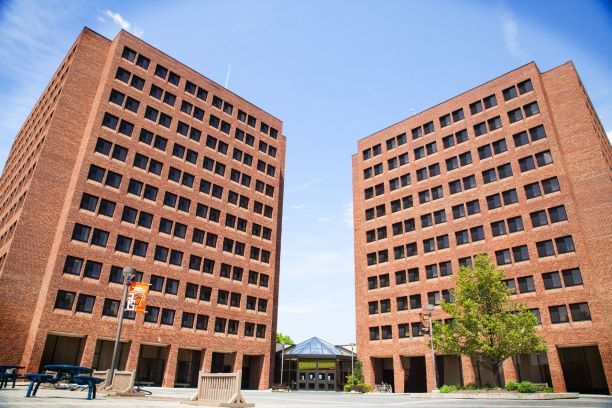Criminal Justice Learning Community
The Criminal Justice Learning Community (CJLC) is a career-based learning community for criminal justice majors. Membership is available to students throughout their four-year experience at BGSU. Members of the learning community take cohort-style classes allowing for projects and experiences beyond the traditional curriculum. As a member-driven community, students will not only attend, but plan and implement projects and experiences that are matched to their common goals and interests.
Important Information
- Fee | $300
- Home | Offenhauer Towers
Contact Us
Catherine Pape
Learning Community Director
cpape@bgsu.edu
419-372-9177

Residential Requirement
Fee* + Residential Fees
Must live in the community? No
Allows roommate pull-ins? Yes
*Fees are per semester.
About the Community
CJLC students live in a distinct population in Offenhauer Towers along with other highly ambitious and motivated students who are members of other learning communities. Students take classes, live, and hangout together easing the transition to college life.
Residential Requirement
Students who are members of the CJLC are not required to live within the community, but it is an added benefit to the program. All students who live within our designed community space are eligible for scholarships that reduce fees to participate in the community. If you choose to live in our space you must choose a roommate who is also a CJLC member.
Offenhauer Towers
This hall houses over 800 students in Double and Single Traditional Rooms with air conditioning. The rooms are some of the largest on campus and the hall features Outtakes Quick Cuisine in the lobby. Fun fact: The Offenhauer Towers are the two tallest buildings on campus at 10 and 11 stories.
Community Highlights:
- Leadership Opportunities – Members have the opportunity to serve in leadership positions to plan trips, tours, community service, and other social events.
- Collaborative Engagements - Serve as mentors to first-year students after the completion of one year in the CJLC.
- Early Internship Experience – Only members are eligible for an early internship experience to be completed during the summer between their sophomore and junior year.
- Accelerated Courses – Members in their junior or senior year have the option to take graduate level course work designed especially for CJLC students with credits counting towards both undergraduate and graduate degrees.
- Professional Development – Meet and interact with guest speakers from local, state, and federal agencies representing all areas of criminal justice.
Engaging Experiences:
- Trips – Members have the opportunity to study abroad and study away. We have rotating trips to the FBI Academy in Quantico, VA and abroad to England, Germany, Austria, and the Czech Republic!
- Tours – We get you out of the classroom and into criminal justice agencies as much as possible. Our members tour police departments, courthouses, correctional facilities, and more. The best way to learn about careers in Criminal Justice is to interact with the people who work in the field!
- Alumni Connections – Many of our guest speakers are BGSU CJ alums! Hear from and make connections with current professionals who host students for shadow days and offer career opportunities.
- Service Learning – Plan and participate in projects that serve at-risk and underserved communities.
- Conferences – Travel and participate in criminal justice conferences in cities such as Chicago, Orlando, Philadelphia, Washington D.C., and Denver.
How to Apply
Each community has a set of residence hall rooms specifically designated for them. To sign up for one of these rooms, you must apply and be accepted into the community. To ensure your chance to live in the community, please complete the following steps:
- Complete your housing application
- Apply here and login with your BGSU username and password
- Click on Add a New Community Enrollment Request and choose your desired community and academic year/term
Please Note: Students can apply only for two communities on their own. If you want to apply to more than two communities, please contact the additional communities you are interested in so they can apply for you. If you have applied for two and change your mind, go into the system and withdraw yourself from the one(s) you are no longer interested in. This will open up a space for you again.
After you have submitted your request to join a community, you will receive an email from the community director approving your request. When it’s time for you to select your room in the next phase, you will be able to view and select rooms within the designated community space in the community’s residence hall. For example, if you choose to join the Chapman Learning Community, you will select a room in Kohl Hall.
Live and Learn with Students who share your passion!
Join one of our residential Learning Communities and take advantage of unique opportunities designed to help you succeed in your personal, professional and academic lives. These communities are comprised of students who share a major or common interest and have a block of rooms inside a residence hall.
Updated: 02/10/2026 08:41AM








